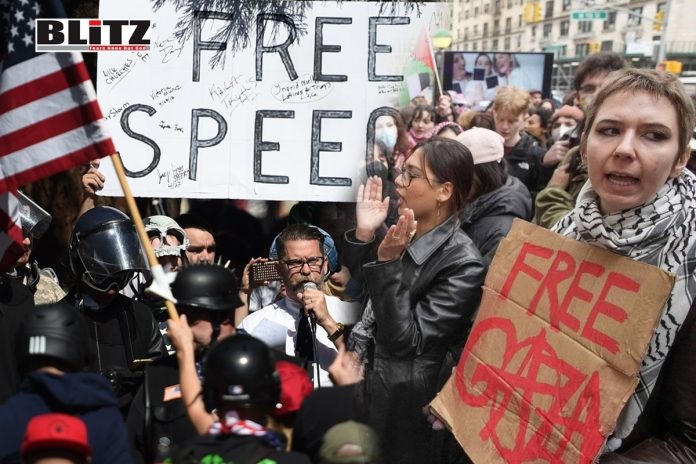The current scenario unraveling on university campuses throughout the United States, notably concerning demonstrations in support of Palestine and condemnation of Israel’s actions in Gaza, has sparked a heated discourse surrounding free speech, academic autonomy, and the involvement of political entities. From the corridors of Columbia University to campuses spanning the nation, confrontations between protesters, institutional leadership, and political figures have thrust these critical matters into the forefront, prompting apprehensions regarding the potential erosion of democratic ideals and the suppression of divergent viewpoints.
The developments at Columbia University epitomize the overarching difficulties confronting academic institutions as they navigate through contentious issues. With the eruption of protests on campus, President Minouche Shafik’s handling of the situation came under intense scrutiny. While Shafik unequivocally condemned antisemitism, her recourse to involve law enforcement and her openness to potentially dismissing professors faced criticism from various quarters, including students, faculty members, and politicians. The adoption of a heavy-handed approach by certain universities, marked by the deployment of police force and the suspension of both students and faculty, has only served to exacerbate tensions and fuel allegations of infringements upon fundamental rights.
The repercussions at Columbia echo broader concerns about the appropriate balance between maintaining order and upholding the principles of free expression and academic freedom. In responding to protests, university administrations are tasked with navigating a delicate path, ensuring the safety and well-being of their campus community while safeguarding the rights of individuals to engage in peaceful dissent. However, the resort to punitive measures such as the use of force and disciplinary actions risks undermining the very values that universities are meant to uphold, contributing to a climate of distrust and discord within the academic community.
Central to this discourse is the fundamental quandary of how universities can uphold their commitment to free speech while fostering a secure and inclusive environment for all members of their community. While combating hate speech and discrimination remains paramount, the manner in which university administrations address dissenting voices holds equal significance. Many voices within academia advocate for a shift towards dialogue and engagement as opposed to punitive measures, viewing this approach as more conducive to the resolution of conflicts and the preservation of academic freedom.
However, the entanglement of political actors in the fray has added layers of complexity to the situation, with partisan agendas often overshadowing the core issues at stake. House Speaker Mike Johnson’s call for President Shafik’s resignation and the suggestion of deploying the National Guard serve as stark examples of how political interests can co-opt campus discourse, thereby compromising the autonomy of academic institutions and deepening rifts within communities. Such interventions not only undermine the integrity of the academic environment but also exacerbate existing divisions, detracting from efforts to foster constructive dialogue and mutual understanding.
Critics have scrutinized President Joe Biden’s response to the protests, suggesting that his hesitance to intervene more assertively signals a preference for political pragmatism over upholding the values of free speech and human rights. Despite his condemnation of antisemitism, Biden’s cautious stance has left a swath of constituents disenchanted, notably within the liberal and youth demographics pivotal to his electoral triumph.
As the protests persist and tensions linger, the call for leadership and principled intervention becomes increasingly urgent. President Biden’s forthcoming commencement speeches offer a crucial platform to directly confront the crisis, reasserting America’s unwavering dedication to the principles of free speech and assembly while unequivocally denouncing hate speech and violence. Through proactive engagement with the issue and a steadfast commitment to fostering dialogue and inclusivity, Biden has the opportunity to showcase decisive leadership on a pivotal issue of contemporary significance.
Looking beyond the immediate political fallout, the unfolding events on university campuses carry profound implications for America’s global reputation as a stalwart defender of democratic principles. The stark images of students and faculty members facing violent arrests and the stifling of protests tarnish America’s image as a bastion of freedom and democracy. Effectively addressing these challenges transcends mere political expediency; it is a moral imperative aimed at safeguarding the foundational principles upon which America was built. Failure to uphold these ideals risks not only eroding America’s credibility but also undermining its longstanding role as a champion of liberty and democratic values on the world stage.
The demonstrations on university campuses amid the Gaza conflict have starkly exposed the intricate interplay between free speech, academic autonomy, and political agendas. As the situation evolves, decisive steps must be taken to safeguard democratic ideals and preserve universities as hubs of free expression and scholarly exploration. President Biden and university officials bear a weighty responsibility to grasp this opportunity and reassert America’s unwavering dedication to the principles of liberty, fairness, and human dignity.




